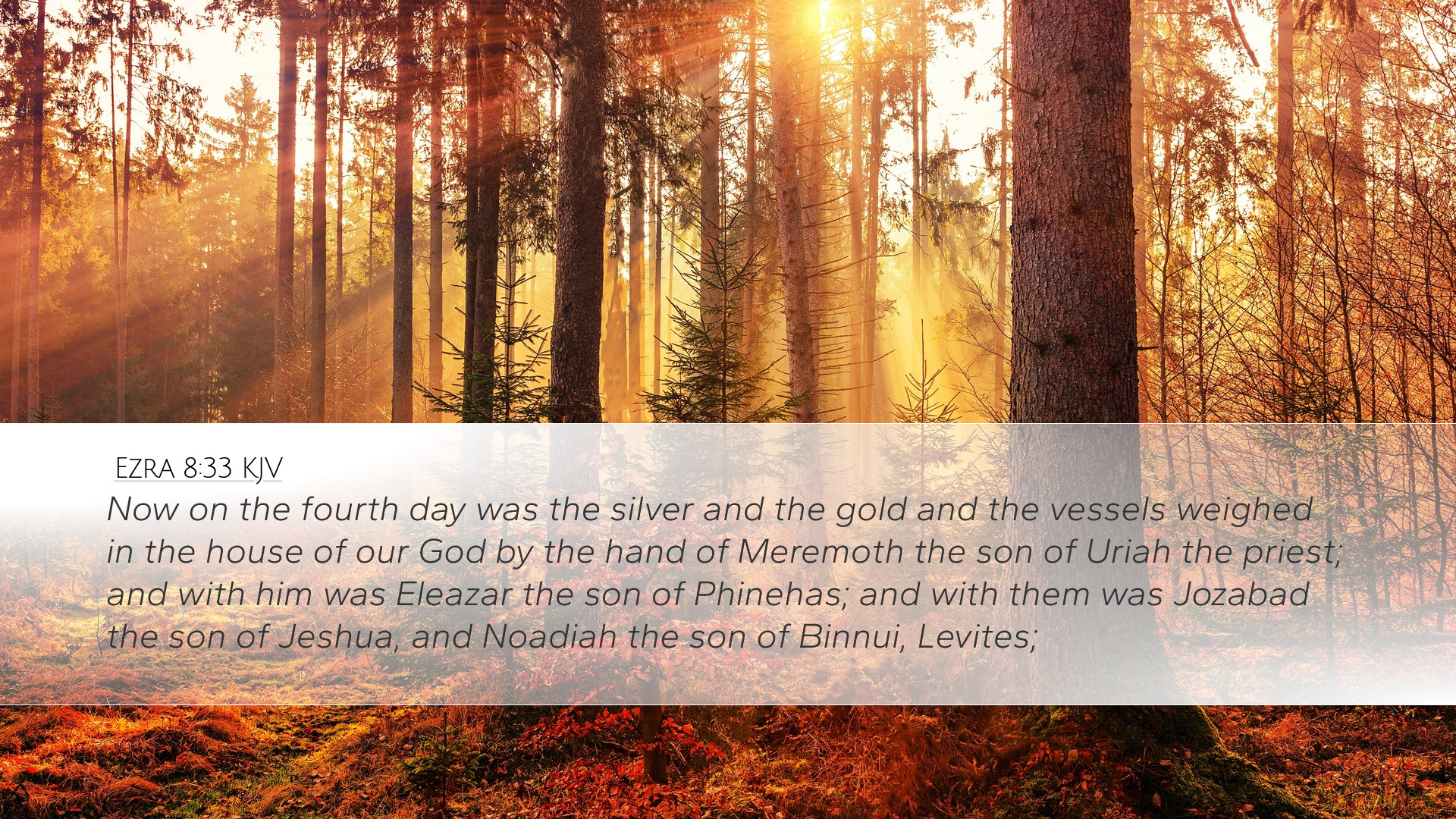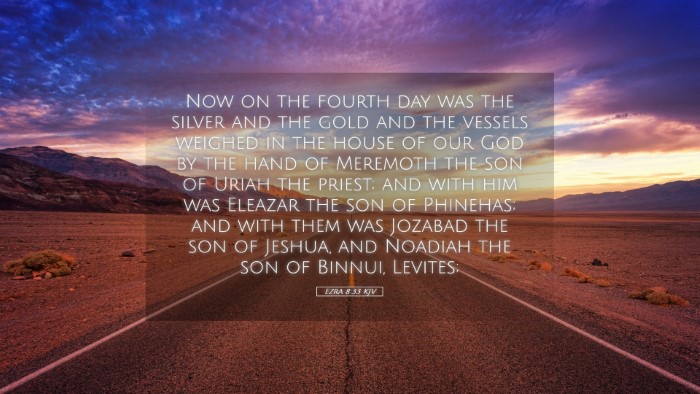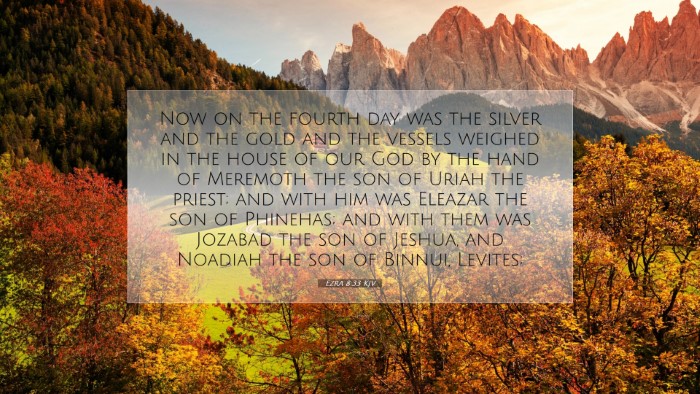Bible Commentary on Ezra 8:33
Verse Context: Ezra 8:33 states, "Now on the fourth day, the silver and the gold and the vessels were weighed in the house of our God, by the hand of Meremoth the son of Uriah the priest; and with him was Eleazar the son of Phinehas; and with them was the Levites, Jozabad the son of Jeshua, and Noadiah the son of Binnui." This verse occurs during a significant time of restoration for Israel, as they return from Babylonian exile under the leadership of Ezra.
Summary of Commentaries
This commentary explores various insights by Matthew Henry, Albert Barnes, and Adam Clarke regarding Ezra 8:33, focusing on key themes such as accountability, divine providence, and the importance of worship in the community of faith.
1. Importance of Weighing the Silver and Gold
Matthew Henry: Henry emphasizes the significance of the weighing of treasures as an act of accountability. He points out that this was not merely a custodial activity; it was a spiritual exercise demonstrating the people's dedication to God. By weighing these items in the temple, the community openly acknowledged God's provision and sovereignty over their riches. This act ensured that they were not misusing what was sacred.
Albert Barnes: Barnes underscores the practical necessity of this weighing to confirm the quantity and integrity of the treasures before they were dedicated to the temple's service. This process shows the seriousness with which the Israelites approached their responsibilities and the importance of transparency in their dealings with God. Barnes notes that such practices foster a sense of trust among the community members, reinforcing the idea that they would handle their resources with care and respect.
Adam Clarke: Clarke extends this understanding by implying that the act of weighing represented a moral and spiritual principle. Each item symbolized not only material wealth but also the covenant faithfulness of God to His people. The meticulous nature of this process reflects the broader narrative of redemption and the sanctity of worship in Israel’s return to their homeland.
2. The Role of Leadership
Matthew Henry: In his commentary, Henry comments on the roles of Meremoth, Eleazar, and the Levites in this process. He highlights that leadership in the spiritual community is critical and that these leaders were entrusted with the sacred duty of managing the offerings. This representation of godly leadership helps to underscore the expectation that leaders must demonstrate integrity and accountability in their service.
Albert Barnes: Barnes adds that the presence of priests and Levites in the weighing process signifies a collective responsibility towards worship and ministry. Their participation underlines the point that each member of the community, especially those in leadership roles, must be involved in the spiritual and material well-being of the congregation. Each leader is essential to maintaining the holiness and trustworthiness of the ministry.
Adam Clarke: Moreover, Clarke notes the historical and theological significance of the priesthood in performing such tasks. The leading figures serve as intermediaries between God and the people, and their integrity is paramount for the community’s relationship with God. Clarke emphasizes the priestly role in facilitating a clean and holy outreach to God, thereby inspiring the faith of the people.
3. Collective Worship and Community Faith
Matthew Henry: Henry points out that the actions of weighing the treasures occurred within the context of communal worship. This illustrates that their approach to resources was not just a personal affair; it was a community-oriented action. Such public acts reflect their collective commitment to God and the importance of seeking His favor through order and dedication to the worship of Yahweh.
Albert Barnes: Expanding on this, Barnes suggests that the community's involvement symbolizes a rebirth of their national identity rooted in faith. As they engage in this act of worship, they are reaffirming their identity as a people set apart for God's service, which is crucial for spiritual renewal after exile. The communal aspect of worship is vital post-exile, where restoration begins with collective acknowledgment of God’s rightful place in their lives.
Adam Clarke: Clarke adds that the worship elements within the community foster a robust environment for spiritual growth and accountability. The weighing of valuables is not simply about money or materials but reflects a heartfelt recommitment to God. It serves as a reminder that all that is entrusted to them—material and spiritual—is a offering to God’s glory.
4. Divine Providence and Faithfulness
Matthew Henry: Henry emphasizes that the act of weighing signifies a recognition of God's providential care. The resources they managed were a testament to God’s faithfulness in their journey back to Jerusalem. This accountability represents gratitude toward God for what they received, invoking a sense of worship and responsibility regarding their gifts.
Albert Barnes: Barnes reflects on the underlying theme of divine providence in the return of the Jewish people. By counting and weighing their proceeds, they acknowledge God's past provisions that sustained them through their exile. Each item weighed commemorates God's continual guidance and sustenance, echoing the idea that their journey was under divine supervision.
Adam Clarke: Clarke also highlights that this act of weighty responsibility foreshadows the future of the community and its faith in God’s promise. Highlighting the past blessings received from God fortifies their trust in His future provision and governance. In weighing their treasures, they express dependence on God and preparation for a life that centers around worship and divine guidance.
Conclusion
The verse Ezra 8:33 encapsulates profound truths about accountability, community, and worship that remain relevant for pastors, students, theologians, and Bible scholars today. Through the insights of Matthew Henry, Albert Barnes, and Adam Clarke, we are reminded of the sacred nature of our resources and what it truly means to be faithful stewards of what God has entrusted to us. May we all strive to incorporate these principles into our lives and ministries as we honor God with all that we possess.


